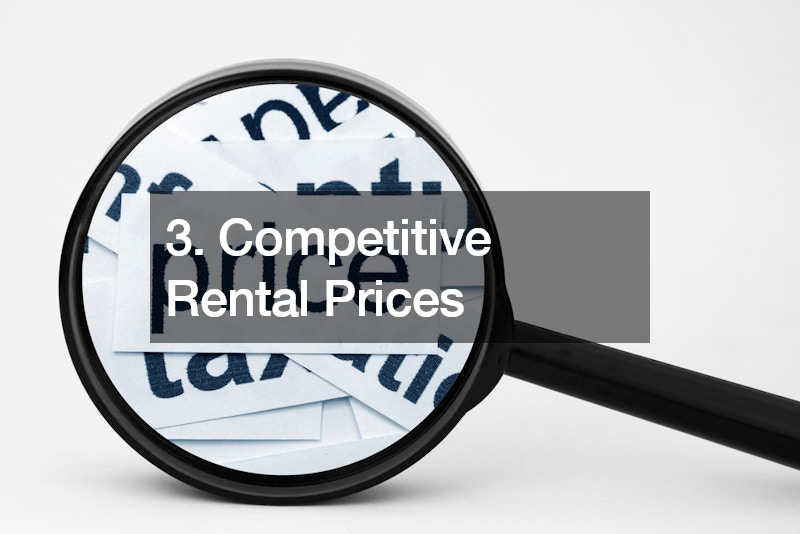Renting out a property can be an excellent way to generate passive income, but it requires careful planning and consideration. As a prospective landlord, you must understand the intricacies involved to ensure a smooth and profitable rental experience. This comprehensive guide will walk you through ten crucial factors to consider before renting out your property.
1. Local Laws and Regulations
Every city and state has unique laws governing rental properties. These laws dictate your responsibilities as a landlord and outline the rights of your tenants. Ignorance of these regulations can lead to legal troubles and financial losses. Therefore, it’s essential to familiarize yourself with local laws, including:
- Tenant Rights: Tenants have the right to a habitable living environment, privacy, and freedom from discrimination. Understanding these rights helps you avoid legal disputes.
- Landlord Obligations: As a landlord, you are responsible for maintaining the property, addressing repairs promptly, and ensuring the safety of the tenants.
Understanding the eviction process is also critical in case you need to remove a tenant for non-payment or other violations. Each jurisdiction has specific procedures that must be followed to avoid legal repercussions.
Moreover, property safety standards, such as smoke detectors, carbon monoxide detectors, and secure locks, must be adhered to. Regular inspections and updates to these safety features are necessary to comply with local regulations and ensure tenant safety. Familiarizing yourself with the rules and regulations for tenants and landlords ensures you provide a legally compliant and safe rental environment.
2. Calculation of Costs

Before renting out your property, you must calculate all potential costs to ensure you remain profitable. This involves identifying expenses such as mortgage payments, property taxes, insurance, maintenance, and repairs. Understanding these costs is crucial for setting an appropriate rental price that covers expenses while generating income. Let’s explore each cost in detail to establish a comprehensive financial plan for your rental property.
- Mortgage Payments: Your monthly mortgage payments should be considered when setting rental prices.
- Property Taxes: Factor in annual property taxes as part of your overall expenses.
- Insurance: Landlord insurance typically covers property damage, liability, and lost rental income.
- Maintenance and Repairs: Regular maintenance and unexpected repairs can be significant expenses.
- Utilities: If you plan to include utilities in the rent, estimate these costs accurately.
Factoring in Vacancy Periods
Vacancy periods, when the property is not generating rental income, are inevitable. It’s crucial to budget for these periods by setting aside funds to cover mortgage payments and other expenses. This financial cushion will help you manage the property more effectively during times when it is not rented. To cover all the bases, implement strategies to minimize vacancies, such as offering incentives for longer leases or conducting proactive marketing campaigns to attract new tenants swiftly. Keeping a proactive approach to tenant retention and lease renewal can also help reduce vacancy rates and maintain steady rental income.
3. Competitive Rental Prices

Balancing price with expenses is crucial. While it’s important to set a competitive price, ensure that it covers all your expenses and generates a profit. Consider the costs of mortgage payments, property taxes, insurance, maintenance, and vacancies when determining the rental price. Underpricing can lead to financial strain, while overpricing may result in extended vacancy periods. Conduct thorough research on the local rental market by:
Comparing Similar Properties
Look at comparable properties in your area to gauge the right rental price. Consider factors such as location, property size, amenities, and condition to accurately assess market value.
Analyzing Market Trends
Stay updated on market trends by monitoring rental listings, vacancy rates, and tenant preferences. Understanding demand fluctuations and seasonal trends can help you adjust your rental prices strategically.
Consulting Real Estate Agents
Real estate agents specialize in local markets and can provide valuable insights into current rental trends. They can offer data-driven recommendations for setting competitive rental prices that attract quality tenants.
Utilizing Mortgage Brokers
Mortgage brokers not only assist in securing financing but also offer insights into financial trends that may affect rental pricing. Their expertise can help you strike a balance between competitive rates and covering expenses effectively.
4. Tenant Screening
Finding reliable tenants is crucial to maintaining your property’s condition and ensuring consistent rental income. Conducting thorough background checks is essential to mitigate the risk of non-payment and property damage. These checks should include:
Credit Checks
Assess the tenant’s financial responsibility and ability to pay rent. Reviewing their credit history provides insights into their past financial behavior, outstanding debts, and creditworthiness.
Employment Verification
Confirm the tenant’s employment status, income level, and stability. Verifying employment ensures they have a reliable source of income to meet rental obligations.
Reference Checks
Speak with previous landlords to gain insights into the tenant’s rental history, reliability, and behavior. Past landlords can provide valuable feedback on rent payment punctuality, property maintenance, and tenant conduct.
Conduct these checks consistently for all applicants to maintain fairness and transparency in your tenant selection process. To comply with fair housing laws, which prohibit discrimination based on race, color, national origin, religion, sex, familial status, or disability, ensure your screening process is fair and unbiased. Avoid asking discriminatory questions or making decisions based on protected characteristics to prevent legal issues and promote equality in housing opportunities.
5. Drafting a Clear Lease Agreement
A well-drafted lease agreement is essential for protecting both you and your tenants by clearly outlining the terms and conditions of the rental arrangement. Key elements to include are:
Rent Amount and Due Dates
Specify the monthly rent amount, due dates, and acceptable payment methods to avoid confusion or late payments.
Lease Terms
Detail the lease duration, renewal options, and conditions for termination. Clearly define any penalties or fees for early termination.
Security Deposit
Define the amount of the security deposit, conditions for its use, and procedures for its return at the end of the lease term. Outline any deductions that may be made and the timeline for returning the deposit.
Maintenance Responsibilities
Clarify the responsibilities of both the landlord and tenant regarding property maintenance and repairs. Specify which party is responsible for routine maintenance tasks and how to handle emergency repairs.
Policies on Pets, Smoking, and Subletting
Outline any restrictions or policies related to pets, smoking, and subletting. Clearly state whether pets are allowed, any restrictions on breed or size, rules regarding smoking on the property, and whether subletting is permitted.
To make your lease agreement comprehensive and legally sound, it’s advisable to have a reputable lawyer review it. A legal professional can ensure the lease complies with local laws and regulations, minimizing the risk of future disputes and protecting your interests as a landlord. Their expertise can provide valuable insights into drafting clear and enforceable terms that benefit both parties involved in the rental agreement.
6. Insurance
Regular homeowner’s insurance may not cover rental activities adequately. Landlord insurance is specifically designed to protect rental properties and typically includes:
Property Damage
Landlord insurance typically includes coverage for various types of property damage, including natural disasters, vandalism, and tenant negligence. Roofing storm damage may also be covered under these policies, providing financial protection in case of roof damage resulting from severe weather events.
Liability
Protection against lawsuits for injuries or damages occurring on the rental property. This coverage extends to incidents involving tenants, guests, or even delivery personnel.
Loss of Rental Income
Compensation for lost rental income if the property becomes uninhabitable due to covered damages, ensuring financial stability during repair periods.
Additional Coverage Options
It’s crucial to review your insurance policy carefully and consider additional coverage options based on your property’s location and specific risks. Depending on your needs, you may want to consult with insurance companies to explore:
- Flood Insurance: Essential for properties located in flood-prone areas where standard policies may not provide adequate coverage against flood-related damages.
- Mold Insurance: Particularly important for properties in humid climates prone to mold growth. This coverage helps mitigate the costs associated with mold remediation and damage repair.
- Umbrella Insurance: Provides extra liability coverage beyond the limits of your standard policy, offering added protection against unforeseen circumstances and higher liability claims.
By ensuring your insurance coverage aligns with the unique risks of renting out your property, you can safeguard your investment and mitigate financial risks effectively. Consulting with insurance professionals can provide valuable insights into tailored insurance solutions that protect both your property and your financial interests as a landlord.
7. Maintenance and Repairs

Regular maintenance is essential to keep your property in good condition and retain tenants. Create a maintenance schedule that includes the following:
Seasonal Inspections
Regular checks to identify issues related to weather changes are essential for maintaining your property’s functionality and preventing future issues. For instance, inspecting the roof after heavy storms or during winter ensures early detection of any damage, which is crucial for promptly addressing maintenance needs and ensuring the property remains in optimal condition. If necessary roofing repairs are identified early, they can be promptly scheduled and completed, minimizing potential structural damage and maintaining the property’s integrity over time.
Routine Repairs
Promptly address minor issues to prevent them from escalating into larger problems that could disrupt tenants or require extensive maintenance. For example, fixing leaky faucets or toilets not only conserves water but also prevents potential water damage to walls and floors. Similarly, repairing cracked or damaged window seals improves energy efficiency and maintains comfortable interior temperatures, thereby reducing long-term heating and cooling costs.
Landscaping
Maintaining the property’s exterior enhances curb appeal and attracts quality tenants who appreciate well-kept surroundings. This includes regular lawn maintenance, such as mowing and trimming bushes, which ensures the yard looks neat and inviting throughout the year. Seasonal flowers or plants add vibrant colors and charm, creating an appealing environment that tenants are likely to value and enjoy.
Emergency Repairs
Emergency repairs, such as plumbing or electrical issues, require immediate attention. Have a plan in place to address these emergencies promptly. Provide tenants with a list of emergency contacts, such as plumbers, electricians, and maintenance services, ensuring they can quickly report issues. Moreover, allocate funds specifically for emergency repairs to avoid financial strain and promptly resolve urgent maintenance needs.
8. Property Management
Deciding whether to manage the property yourself or hire a property management company is a significant consideration. Each option has its pros and cons:
Self-Management
While self-managing saves money, it requires a considerable investment of time and effort. As the landlord, you will be responsible for all aspects of property management, from tenant screening and lease agreements to handling maintenance requests and collecting rent. This hands-on approach allows you to maintain direct control over your investment and tenant relationships.
However, it also means staying updated on legal requirements, handling emergencies promptly, and managing day-to-day operations without professional assistance. The time commitment can be substantial, particularly if you have multiple properties or a full-time job outside of property management.
Property Management Company
In contrast, hiring a property management company offers convenience and expertise in managing rental properties. These companies handle day-to-day operations, tenant interactions, and maintenance issues on your behalf. They bring professional knowledge of local rental markets, legal compliance, and property maintenance, which can streamline processes and reduce your workload significantly.
While this option incurs additional costs, such as management fees or a percentage of rental income, it frees up your time for other pursuits or investments. If you opt for rental management services, ensure you choose a reputable company by researching and reading reviews. Interview potential companies to inquire about their services, fees, and management style, and check references to gauge other landlords’ satisfaction with their services.
9. Preparing the Property

Ensure your property is clean, well-maintained, and safe for tenants before renting it out. Consider the following to make a positive impression and attract quality renters who will appreciate the care you’ve taken to maintain the property:
Repairs and Upgrades
Start by addressing any necessary repairs, such as fixing leaky faucets or repairing damaged walls, to create a comfortable living environment. Upgrading fixtures and appliances improves the property’s aesthetic appeal while enhancing functionality for tenants. Conducting mold testing is also essential to identify and mitigate any potential health hazards, ensuring the property meets safety standards.
Inspecting Locks
Inspecting locks is another critical step to enhance security. Ensure all locks are secure and in good working condition to provide peace of mind to your tenants and protect their belongings.
Enhancing Curb Appeal
First impressions are key when attracting potential tenants. Maintain a well-kept lawn and regularly trim bushes. You may also consider investing in professional house cleaning services to power wash the exterior and clean windows thoroughly. A clean and welcoming entryway sets a positive tone and encourages prospective tenants to envision themselves living on the property. Finally, a fresh coat of paint can dramatically improve the property’s appearance, making it more appealing and increasing its marketability.
10. Effective Marketing
Effective marketing is key to quickly finding tenants. Here’s how to boost your property’s visibility and attract potential renters.
Creating Attractive Listings
Start by creating attractive listings that showcase your property’s best features. Capture high-quality photos using optimal lighting and angles to present the property in its best light. Write detailed descriptions that highlight key information such as the number of bedrooms and bathrooms, available amenities, and its proximity to schools or public transportation. Emphasize unique selling points, such as a newly renovated kitchen or a spacious backyard, to attract potential tenants looking for specific features.
Utilizing Multiple Platforms
To maximize exposure, list your property on various platforms where potential tenants are actively searching. Utilize popular online rental platforms like Zillow, Trulia, and Craigslist to reach a wide audience of renters. Showcase your property and engage with potential tenants directly on social media platforms such as Facebook, Instagram, and Twitter. Furtherrnore, advertise in local classifieds, newspapers, and community bulletin boards to target renters in your area effectively. Listing your property on the homeowners association website can also attract potential tenants who are already interested in your neighborhood.
Engaging With Potential Tenants
Engaging promptly and professionally with potential tenants can significantly impact your rental success. Respond to inquiries promptly and provide clear, detailed information about the property. Be flexible and accommodating for property showings to accommodate potential renters’ schedules. Offering exceptional customer service from the initial contact stage helps build trust and confidence in your property management skills. By maintaining open communication and promptly addressing tenant questions or concerns, you increase your chances of attracting and securing quality tenants for your rental property.
Closing Thoughts
By considering these factors, you can effectively manage the process of renting out your property and establish the foundation for a successful, profitable rental business. Proper preparation and management are key to becoming a successful landlord. With careful planning and attention to detail, you can maximize your rental income while minimizing risks and ensuring a positive rental experience for both you and your tenants.





